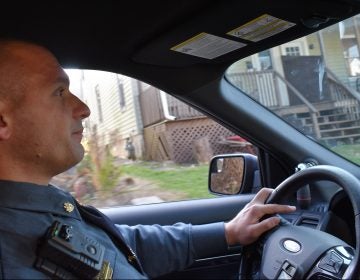Pa. Senate votes to make it easier to take guns from violent domestic abusers
Wednesday the Pennsylvania Senate approved a bill that makes those convicted of domestic violence or subject to a restraining order turn over their guns more quickly.
Listen 4:43
Chanda Mobley was in an abusive relationship for five years. Her husband would hit her, which was bad enough, she says. Eventually, her teenage son would tried to stand up for her. That's when her husband would bring out his gun. (Courtesy of Chanda Mobley)
The Pennsylvania Senate passed a bill Wednesday aimed at tightening gun restrictions on people convicted of domestic violence or subject to restraining orders.
In 2016, 102 people in the state were killed in domestic violence incidents, and guns were used in more than half of those crimes.
In a political climate where gun control bills are hotly debated, everyone seemed to agree: abusers shouldn’t have guns. The Senate approved the bill, along with a package of other protections for victims of domestic abuse, unanimously. The bill will be considered in the House in April.
Firearms have accounted for more than half of all domestic violence- related homicides over the past decade. The stories of survivors such as Chanda Mobley shed light on the ways abusers can use guns as tools to invoke fear and control.
Mobley was in an abusive relationship for five years. Her husband would hit her, which was bad enough, she says. Eventually, her teenage son would tried to stand up for her. Her husband was not as confident his physical strength would be a match for his stepson, so he would threaten to use his gun.
“He would start arguments with my son because he would play the game too loud,” Mobley explained. “And he would go in his room, and he would say he wanted to blow his head off. And then when he wasn’t fighting him, he was fighting me.”
Mobley said the gun made her fear for her life and her son’s.
“This is what happens in these situations,” said Mobley. “Either you jeopardize your family, or I get hurt.”
After her husband had brandished a gun at neighbors and shot it into the air in the middle of the street, she had enough. So, she filed a protection from abuse order, or a PFA. It required that her ex stay away from her and stay out of communication. Because she reported that he had a gun, the judge required he turn it in.
“He got rid of it, because he knew that I reported it,” she remembered. “What he did with it, I have no idea.”
Getting around order to relinquish weapon
And in fact, that’s legal. Right now in Pennsylvania, if you’re convicted of a domestic violence crime, you don’t have to turn your gun into the police. You can give it to a friend, or a family member — where it could still be used by abusers as leverage. And if you’re just issued a PFA, it’s not mandatory that you turn over your firearms. It’s up to the judge’s discretion.
Having a PFA filed against you is a civil offense. Violating a PFA counts as a domestic violence crime, as do a range of other acts including assault, stalking, kidnapping and child abuse, which may or may not come along with a PFA.
People convicted of a domestic violence crime have 60 days to relinquish their guns in Pennsylvania. Susan Sorenson, who studies guns and intimate partner violence at the University of Pennsylvania’s Ortner Center, said a lot can happen in 60 days. In fact, the time when an abuse victim is leaving — and filing for the PFA — is the time when, statistically, she is the most vulnerable.
“Abusers are like the rest of us,” said Sorenson. “When someone ends a relationship you don’t want to end, you’re hurt, you’re angry. And with abuse, there’s an added component because the person has spent sometimes years controlling that person. And then when they have a gun, they can lash out in a way that is lethal.”
The role of police
Whether the person has been convicted of a domestic violence crime or just has a PFA against them, the police aren’t doing all that much to make sure that they’re staying away from the person who filed the order, said Mike Gallagher, a retired police officer who was on the Philadelphia domestic violence unit for eight years. It’s really up to the person who filed the order to report any violations, he said.
“The police can’t be everywhere. We can’t put the people in bubble wrap and keep them safe forever,” he said.
But, said Gallagher, the police could do more — if they were allowed to. That’s why he and others are pushing for the bill that the Senate just approved. Under the bill, people convicted of domestic violence crimes would would have to turn over their guns in 48 hours, instead of 60 days. And the guns would have to go to law enforcement, their lawyer, or a licensed gun dealer, not just anybody.
“That will help enhance the confiscation of weapons and get ’em out of the hands of dangerous people, quicker,” said Gallagher.
Failing to turn over the gun in one of these cases could land you in prison for two years. Still, said Sorenson, a law is just a starting point. There must be clear guidelines on how it’s enforced.
“We have to designate who is doing this,” she said. “We are relying on the honor system essentially for abusers to say, yes I have a firearm and here are my handguns.”
‘Boyfriend loophole’
Sorenson’s research in California found that, without clear delineation of roles, it was easy for enforcement to slip through the cracks. There, for instance, administrators weren’t entering PFAs into the state database quickly enough, meaning that even though the order is supposed to prevent gun purchases, people with active PFAs were still making it through background checks without being flagged.
Another challenge is that while PFAs are designed to protect people from intimate partners, not everyone falls under the category of “intimate partner.” This phenomenon is known as “the boyfriend loophole.” It means that, under federal law, the requirement to turn over guns doesn’t apply to people who are just dating. You have to be married, have been married, live together, have lived together, or share a child.
“People are marrying later these days, they’re less likely to have kids, there are just lots more boyfriends and girlfriends,” said Sorenson. “We simply have more people who are not covered by federal laws.”
To avoid this, many states have laws that expand the definition of intimate partners. In Pennsylvania, “current or former sexual or intimate partners” are included in the definition of people who can have their guns taken away. So, for PFAs where a judge orders firearm relinquishment, it would apply to any current or former intimate partner.
That said, for misdemeanor crimes of domestic violence, the definition is more narrow, and the boyfriend loophole still applies.
‘You don’t know if you’re going to live or die’
Mobley agrees that a PFA can only go so far. She sais she found out that her ex-husband had two filed against him during a previous relationship. But, she said, making it harder for someone like her ex to get a gun would be a good step.
“When there’s a gun involved, at any moment you don’t know whether you’re going to live or die,” said Mobley. “Like your life, you know it’s is going to be like when you get up in the morning. I didn’t know what my life was going to be like, from day to day. From hour to hour.”
Mobley finally got out of her relationship. She moved where her ex couldn’t find her. But, she said, now, he’s remarried.
If you are experiencing domestic violence and need assistance, the citywide, 24-hour Philadelphia Domestic Violence Hotline is (1-866-723-3014). All calls are free, confidential and anonymous.
WHYY is your source for fact-based, in-depth journalism and information. As a nonprofit organization, we rely on financial support from readers like you. Please give today.





